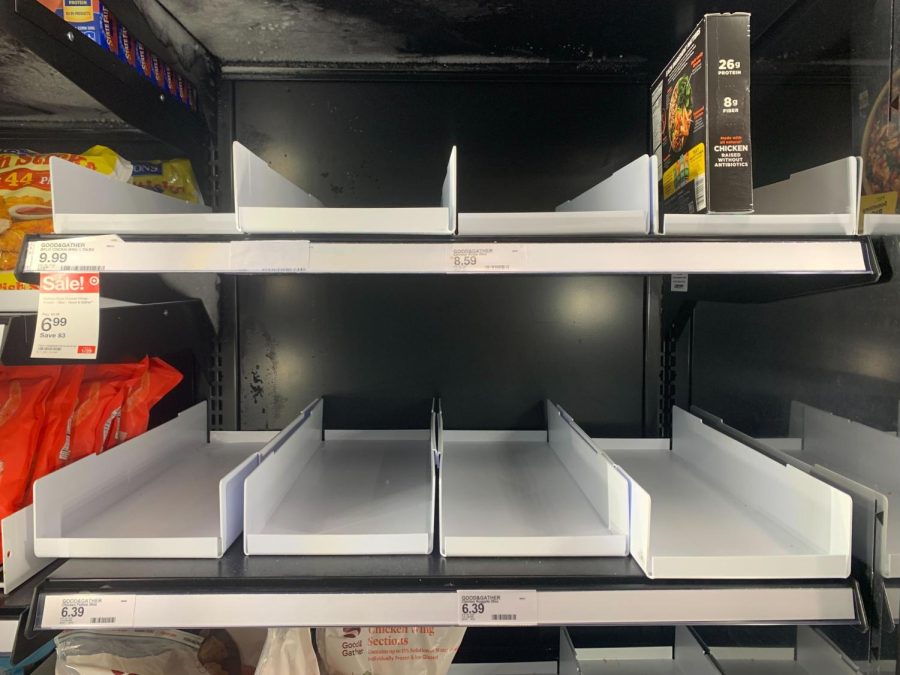Food shortages, inflation cause students to adjust diets
An empty shelf of frozen food sits in the Target on Green street. Other locations around town are dealing with supply shortages that many students say are impacting their eating routines.
January 28, 2022
In the middle of the dairy section at the Target marketplace on Green and 6th St, Jonas Sodini, junior in the College of Engineering, was shopping for groceries.
However, his trip was cut short when he saw that the refrigerated shelves were almost empty and missing specific items that he needed. Nationwide supply chain issues, food shortages, and rising inflation issues have made their way onto campus.
In turn, students like Sodini have felt the effects of the national issues. They have had to make adjustments to their daily shopping trips as well as their diets.
“I buy a lot of alternatives because my brother has a lot of allergies,” Sodini said. “So it’s kind of important that I have this stuff. When I can’t buy it, it makes it difficult to have something for him to eat as well.”
Sodini does have a car that allows him to travel across town to find the necessary products, but he is aware this is not a privilege much of the student population has. However, for most on-campus students, the convenience of the Target store on Green Street is dampened by shortages that make quick runs for items more tedious.
Get The Daily Illini in your inbox!
“If I needed something quick, a lot of the time I come here to Target, and they don’t have soy milk, which is super annoying as I use it a lot,” he said.
Food prices have been skyrocketing in the last few months. In December, the Bureau of Labor Statistics cited a 6.4% increase in grocery prices, the largest 12-month increase since December 2008. Combined with supply chain shortages that have persisted since the onset of the pandemic, students are becoming stressed about the ripple effect of these shortages on their diets.
Nationally, there is no end in sight to the ongoing issues. Locally, it is becoming increasingly difficult to make up for what is being lost.
Cassandra Soto, junior in the College of Engineering, described how she could no longer eat the healthy foods she wanted to. The production of such foods has been impacted the most by the effects of the food and labor shortage.
“It has made it a lot harder to have access to healthier foods and vegetables,” Soto said. “When there are vegetables at Walmart, or any of the discounted stores, they aren’t high quality. It’s harder to live a healthier lifestyle and take care of yourself if it’s inaccessible.”
Like many others, Soto has tried to go to different stores, but her lack of a car limits where she can reasonably travel for shopping. She only has access to on-campus stores.
As a vegetarian, Meghana Mangalvedhe, sophomore in the College of Engineering, has found the shortages particularly difficult.
“I’m vegetarian, so I am already limited in what stuff I can get here at Target,” Mangalvedhe said. “Not having food is inconvenient as I have to go all the way over to County Market just to get vegetables, as well as my other protein stuff, it’s really inconvenient.”
Michael Hsu, junior in LAS, has had to adjust his meat-heavy diet because of the extensive inflation of meat products.
“I had to change, I had to skip out on chicken sometimes,” Hsu said. “I resort to eating out, which causes me to spend more. I’d rather not spend as much.”
Furthermore, the issue isn’t exclusive to students. Kerem Catalbas, a faculty member out of MCB, was having trouble finding his grocery items at Target.
“It limits my options and now, most of the time the cheapest option is the one I get,” Catalbas said.
He also explained that resorting to the cheapest option sometimes leads to lesser-quality foods. Buying lower-quality, cheap foods is a reality that many have had to adjust to because of the current shortages.
While many have described the supply chain issues as a burden, some students have spoken in contrast. They say that the shortage did not affect them significantly.
Ella Feret, junior in LAS, wasn’t stressed about her next trip to the grocery store.
“It honestly hasn’t really affected me much,” Feret said. “Financially, it has affected me, but I can still find everything I need.”







